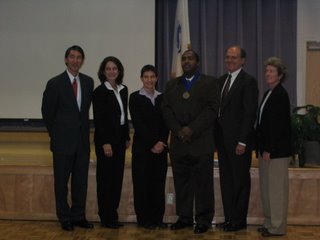Last night Coach Roderick Jackson, the litigant in Jackson v. Birmingham Board of Education, addressed a Western New England College audience of a couple hundred students, faculty, administrators, and members of the Springfield community. We learned about the conditions his players on the girls basketball team faced: they practiced in a cold, old gym with sloped floors. They made their own travel arrangements to the game; their (winning) junior varsity program was eliminated. In contrast, the boys team played in a new facility with comfort and amenities. School buses transported them to all away games. Their (losing) junior varsity team was spared. Jackson pointed out these inequities to school officials in his chain of command, but was told things like "they're just girls" and "don't make trouble." He persisted, believing that not 't fight against the discrimination that he saw was tantamount to participating in it. Eventually his efforts to secure equal treatment for his team got him fired from his coaching position. With the help of a pro bono lawyer, Jackson sued the school board, but when he lost, the lawyer could not help him file an appeal. So Jackson--a teacher, not a lawyer--wrote his appellate brief himself in less than 2 weeks (he learned about the brief deadline when a clerk called to tell him it was 14 days away). The Eleventh Circuit was impressed enough with his arguments to grant a hearing, but in the end it too denied his claims. But Jackson didn't quit, and eventually his case got a boost when the National Women's Law Center and superlawyer Walter Dellinger offered to appeal his case to the Supreme Court. At last, Coach got a "W" last March when the Supreme Court ruled 5-4 that retaliation was actionable under Title IX. The case was remanded and is still pending in the lower courts (no, believe it or not, the school board hasn't conceded).
What was most impressive to me about Jackson's story was the certainty with which he took every step. It didn't occur to him not to raise the issue and fight the school board. Then he loses his coaching job, loses in district court, loses his lawyer. So the man writes his own brief -- as it was the obvious the thing to do, as if accepting the status quo was not even an option. Giving up on a task, which, frankly, intimidates trained lawyers, never seemed to cross his mind. He called that brief as a hail mary pass. But it saved the case by keeping it alive and preserving the possibility for a Supreme Court appeal.
 Here is the Coach, along with the panelists who gave context to Coach's story by talking about the history of Title IX and the legal significance of the Court's decision, as well as our college president who honored Coach Jackson with the President's Medallion. From left to right: Professor Curt Hamakawa, WNEC School of Business; Assistant AD Cindy Costanza of WNEC; Professor Erin Buzuvis, WNEC School of Law; Coach Roderick Jackson from Birmingham; President Anthony Caprio of WNEC; Dr. Carol Barr, University of Massachusetts.
Here is the Coach, along with the panelists who gave context to Coach's story by talking about the history of Title IX and the legal significance of the Court's decision, as well as our college president who honored Coach Jackson with the President's Medallion. From left to right: Professor Curt Hamakawa, WNEC School of Business; Assistant AD Cindy Costanza of WNEC; Professor Erin Buzuvis, WNEC School of Law; Coach Roderick Jackson from Birmingham; President Anthony Caprio of WNEC; Dr. Carol Barr, University of Massachusetts.
No comments:
Post a Comment